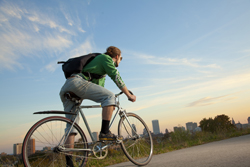Cycling: a life-saver
Cycling not only increases individual fitness. Abandoning your car for even a few journeys will contribute to reduction of global pollution from fossil fuels with a corresponding fall in respiratory and related diseases worldwide. The EU-funded project Velo.info aimed to help local authorities and transport planners to encourage people to spend at least small amounts of their time cycling. Facilitating the public to take the plunge and ride a bike is no easy task. One major way to persuade non-cyclists to start is to make them aware of the benefits to their health. Despite awareness campaigns, it seems as if the general public are quite reluctant to exercise the recommended 30 minutes a day. Cycling, the Velo.info members argue, is one of the most simple but effective ways of getting exercise. Not only is it aerobic and therefore fights cardiovascular disease, but it is non-weight bearing and will not compromise those ageing joints, ligaments and muscles. The feeling of well-being after cycling is also a significant boost to health. Studies suggest that exercise can help combat anxiety and depression. However small the psychological benefits, the cycle of sedentary lifestyle leading to depression, which in turn discourages physical activity, can be broken. The main benefit of cycling is that it fulfils a function, getting to work or encouraging children to travel independently from their parents. Self-motivation is not necessarily required as would be the case for joining a gym, for example. Working against cycling is the fear factor of being amongst other traffic. Velo.info partners are aware that local authorities need to improve conditions for cyclists by providing cycle lanes and imposing appropriate traffic speed limits. Statistics from the Netherlands and Denmark show a marked decrease in the number of cycling accidents once the roads are made safer. To disseminate information between transport policy makers, project partners have established a web-based expertise centre on bicycle use and planning policies. The network can be used to distribute information efficiently between interested parties and to share their skills and experience. The Velo.info project is making major headway to persuade the public to achieve their exercise quota by investing in a bike and taking up cycling. Once this mode of behaviour is part of lifestyle, the benefits of exercise can be continued into retirement.







